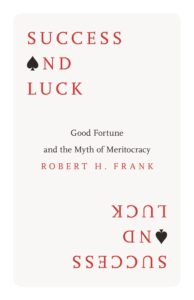What makes someone an effective entrepreneur? How do they get that way?
This question drives at what many founders, VCs and business writers spend their careers working to figure out. Yet what does the research say? Is entrepreneurship a skill, a personality type, or pure luck? Can entrepreneurship be taught? If so, can people get better at it? What does a good entrepreneurship education look like? Are serial entrepreneurs more likely to succeed?
Here is what some recent literature says. Please let us know if there are additional perspectives you believe are helpful in answering this question.
Learned Skill
Stanford University, “Entrepreneurship Can Be Learned”: Some professors argue entrepreneurship is a skill that can be acquired through education. Leading 20th century management consultant theorist Peter Drucker argued that “[Entrepreneurship] is not magic, it’s not mysterious, and it has nothing to do with the genes. It’s a discipline [that] can be learned.” Both Indiana University professor Donald Kuratko and President of Olin College Richard Miller said that business education needed to be reformed in order to create innovators, rather than experts. Who is best equipped to teach entrepreneurship? A Baylor University study showed that economists generally lack an understanding of what makes up strong entrepreneurship education relative to management consultants. Perhaps learning at an earlier age is most important. The chess teacher Lazslo Polgar trained three of his children to be chess grandmasters. His secret was starting early. Read more from Stanford.
Natural Ability
James Koch (Old Dominion University) and Julian Lange (Babson College): In this Entrepreneur Magazine interview, both professors argue that successful entrepreneurship is a result of a mix of environment, education, and “natural ability”. James Koch says that some personalities (risk takers, for example) are better suited for entrepreneurship. Education can help make someone better, but Koch says personality is ultimately more important. Other authors, such as James Fisher, argue that innovators are clearly “born and not made” through genetic characteristics. Julian Lange believes personality is also important, though he thinks education produces a more substantive difference in making someone a successful entrepreneur. He cites a study he conducted that found taking two or more classes on entrepreneurship positively affected a student’s chance of success and that there was no significant effect of having parents who were entrepreneurs. Read the interviews.
Luck
 Robert Frank, “Success and Luck—Good Fortune and the Myth of Meritocracy”: Robert Frank argues people who amass great fortunes tend to be hardworking and talented. Yet luck undoubtedly plays a large role in determining who is successful, since many hardworking and talented people never become successful. Social scientists found that chance plays a larger role in determining important life outcomes than people might imagine. Frank shows the rich underestimate the importance of luck consistently, especially in an economy with a larger number of winner-take-all markets and more inequality.
Robert Frank, “Success and Luck—Good Fortune and the Myth of Meritocracy”: Robert Frank argues people who amass great fortunes tend to be hardworking and talented. Yet luck undoubtedly plays a large role in determining who is successful, since many hardworking and talented people never become successful. Social scientists found that chance plays a larger role in determining important life outcomes than people might imagine. Frank shows the rich underestimate the importance of luck consistently, especially in an economy with a larger number of winner-take-all markets and more inequality.
Circumstance
Equality of Opportunity Project (Harvard University): “Who Becomes an Inventor in America? The Importance of Exposure to Innovation” Led by eminent economist Raj Chetty, this study looks at the conditions that allow certain Americans to become innovators as opposed to others. The report found that high-income households were more likely to invest in educational opportunities— children in low income households are exposed to 636 words an hour as opposed to 2,153 words in high income households during their first four formative years. Children from low income households were much less likely to be an innovator than children in upper income households. These disparities are not purely a result of education. The study shows that “kids born into the richest 1 percent of society are 10 times more likely to be inventors than those born into the bottom 50 percent”. The highest scoring low income students in math were only as likely to hold patents in STEM as the lowest scoring high income students were. Barriers include health care, access to capital, family education, and industry connections.
Previous Successful Experience
Harvard Business School, Performance Persistence in Entrepreneurship: This study shows that entrepreneurs with a track record of success are much more likely to succeed than first-time entrepreneurs and those who have previously failed. This is in part because they are more successful at selecting the right industries to innovate in and the right timing. The authors note this may be self-fulfilling; if suppliers and customers think the entrepreneur is good at timing, that might “make” the time good. So success can spur further success.
by Miles Lasater with Julian Jacobs
